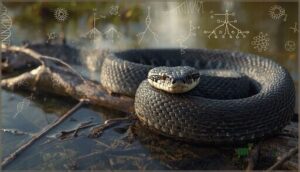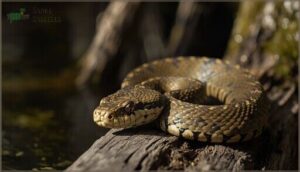This site is supported by our readers. We may earn a commission, at no cost to you, if you purchase through links.
You’re knee-deep in a murky Southern swamp when you spot a thick, dark snake coiled on a half-submerged log. Your heart races. You freeze. The question hits you instantly: can a water moccasin kill you?
The short answer is yes, but death from their bite is exceptionally rare—far rarer than most people think. These pit vipers pack hemotoxic venom that destroys tissue and disrupts blood clotting, yet with modern antivenom and prompt medical care, survival rates hover near 100%.
The real danger isn’t the snake itself—it’s the panic, the delayed treatment, or the remote location that turns a manageable medical emergency into something far more serious.
Table Of Contents
- Key Takeaways
- Can a Water Moccasin Kill You?
- What is a Water Moccasin?
- Where Are Water Moccasins Found?
- How Dangerous is a Water Moccasin Bite?
- What Are The Symptoms of a Water Moccasin Bite?
- How Fast Do Symptoms Progress After a Bite?
- How is a Water Moccasin Bite Treated?
- How Can You Prevent Water Moccasin Bites?
- Frequently Asked Questions (FAQs)
- What happens if a water moccasin bites you?
- Can you survive a cottonmouth bite without treatment?
- How fast does water moccasin venom kill?
- Will water moccasin kill a dog?
- Are water moccasins dangerous?
- Is ricin lethal?
- How to remove a water moccasin?
- Can a water moccasin bite cause death?
- Do water moccasins have venom?
- Can water moccasins bite you underwater?
- Conclusion
Key Takeaways
- Water moccasin bites can technically kill you, but deaths are extraordinarily rare—fewer than 12 fatalities in 40 years across North America, with survival rates near 100% when you get prompt medical care and antivenom.
- The venom is hemotoxic, meaning it destroys tissue and disrupts blood clotting, causing immediate sharp pain and rapid swelling that can spread up your entire limb within hours if untreated.
- Your biggest danger isn’t the snake itself but delayed treatment, panic, or being in a remote location—most fatalities occur when people can’t reach hospitals quickly enough for antivenom administration.
- Prevention is straightforward: wear tall boots and long pants near wetlands, watch where you step and reach, keep your yard clear of debris piles, and back away slowly if you spot one rather than trying to handle or kill it.
Can a Water Moccasin Kill You?
Yes, a water moccasin bite can kill you, but deaths are extremely rare. With prompt medical care and antivenom, the vast majority of people survive without life-threatening complications.
For a detailed breakdown of symptoms, treatment options, and survival rates, see our complete guide on whether a cottonmouth bite can be fatal.
Let’s look at the actual risk, what the numbers tell us, and why getting treatment quickly makes all the difference.
Fatality Risk of Water Moccasin Bites
Water moccasin bites can kill you, but fatalities are extremely rare. Your survival odds skyrocket when you get prompt medical care and antivenom.
Here’s what influences mortality rates and treatment outcomes:
- Children and the elderly face higher risk from the same venom effects that adults tolerate better.
- Delayed treatment turns manageable bites into life-threatening emergencies within hours.
- Large venom doses overwhelm your body’s defenses, causing severe bite severity complications.
- Remote locations without quick hospital access dramatically increase danger from any venomous snake encounter.
- Your overall health determines how well you handle the hemotoxic assault on blood and tissue. If you want to learn more about prevention, first aid, and treatment, see these essential water moccasin bite risks.
Documented Cases and Statistics
Over the past 40 years, fewer than 12 fatalities from this venomous snake have been documented across North America. That’s less than 1 percent of all reported snake bite cases in the southeastern United States.
Water moccasin deaths are extraordinarily rare—fewer than 12 fatalities in 40 years across North America, representing less than 1% of southeastern snake bites
| Region | Fatality Pattern |
|---|---|
| Florida, Georgia, Carolinas | Most deaths occur here |
| Rural swamps and marshes | Delayed medical access increases risk |
| Remote freshwater areas | Secondary infections complicate outcomes |
Most deaths happen when people can’t reach hospitals quickly.
Importance of Timely Treatment
Getting help fast makes all the difference. When you reach a hospital quickly, antivenom can neutralize venom before severe tissue damage sets in. Here’s why rapid medical attention matters:
- Early antivenom limits local swelling and necrosis at the bite site
- Prompt fluids support your blood pressure and organ function
- Hospital monitoring catches breathing problems before they worsen
- Faster treatment means shorter recovery and better limb function
Emergency response transforms a dangerous snake bite into a survivable event.
What is a Water Moccasin?
Before you can protect yourself, you need to know what you’re dealing with. Water moccasins are venomous snakes with some unique traits that set them apart from harmless water snakes.
Let’s break down their scientific background, what they actually look like, and clear up the whole cottonmouth confusion.
Scientific Name and Classification
You’ll see this venomous snake listed as Agkistrodon piscivorus in field guides—that’s the cottonmouth snake’s official name. It belongs to the pit viper family Viperidae, sharing the genus Agkistrodon with copperheads. The species name “piscivorus” means fish-eating, a nod to its waterside diet.
| Classification Level | Water Moccasin Taxonomy |
|---|---|
| Family | Viperidae (pit vipers) |
| Genus | Agkistrodon |
| Species | piscivorus |
| Common Names | Cottonmouth, water moccasin |
| Venom Type | Hemotoxic snake venom |
Physical Characteristics
You’ll recognize cottonmouth snakes by their stocky build and distinctive triangular head. Adults typically stretch 3 to 4.5 feet, though some exceed 5 feet.
Their venom packs a serious punch, and while surviving a rattlesnake bite without treatment is technically possible, larger pit vipers like cottonmouths deliver more dangerous bites that demand immediate medical attention.
Here’s what sets these pit vipers apart:
- Broad, flat head with heat sensing pits between nostril and eye
- Keeled scales that feel rough when touched
- Olive to dark brown bodies with fading crossbands
- Vertical pupils and copper-colored eyes
Their sturdy jaw structure houses long, hinged fangs for venom delivery.
Cottonmouth Vs. Water Moccasin
Here’s a simple truth: water moccasin and cottonmouth snake are two names for the same venomous reptile, Agkistrodon piscivorus. No species identification confusion is needed.
Regional preferences drive the naming—southerners often say cottonmouth while others prefer water moccasin. Both terms describe identical venom, bite prevention needs, and habitat requirements.
| Feature | Details |
|---|---|
| Common names | Water moccasin, cottonmouth snake |
| Scientific name | Agkistrodon piscivorus |
| Venom type | Hemotoxic requiring antivenom |
| Habitat analysis | Semi-aquatic wetlands |
| Snake behavior | Defensive mouth display |
For a more detailed look at their native range and traits, see this summary of cottonmouth range and habitat.
Where Are Water Moccasins Found?
You won’t find water moccasins sunbathing in California or lurking in Colorado streams. These snakes stick to specific regions where the climate and landscape suit their semi-aquatic lifestyle.
Let’s look at where they live, what kind of environments they prefer, and when they’re most active throughout the year.
Geographic Range in The U.S
You’ll find water moccasins mostly across the Southeastern United States, from Virginia down through Florida and west into Texas. Their geographic boundaries follow wetland ecosystems along the coastal populations of the Gulf and Atlantic. Regional variations exist—Georgia, South Carolina, and Louisiana host dense numbers.
This venomous snake sticks to areas with warm winters and plenty of water, so northern states rarely see them. Snake habitat distribution matters when you’re planning outdoor trips.
Preferred Habitats and Environments
Water moccasins love slow-moving wetlands—swamps, marshes, ponds, and riverine ecosystems with thick aquatic habitats. You’ll spot them basking on muddy banks near submerged vegetation, using floating debris as cover.
These coastal wetlands and freshwater zones offer the reptile behavior and habitat they need: warm shallows for hunting fish and amphibians, plus shade from riparian forests. Understanding swamp environments helps you navigate snake safety during wildlife encounters.
Seasonal Activity Patterns
You’ll encounter water moccasins most in late spring and summer, when warm weather activity peaks above 85°F. As temperatures drop in early fall, cottonmouth snake behavior shifts—they slow down, eventually entering hibernation patterns in colder regions.
After rains, these venomous snakes increase movement and basking. Understanding these seasonal habitat preferences and temperature effects on reptile behavior helps you avoid risky encounters.
How Dangerous is a Water Moccasin Bite?
A water moccasin bite isn’t something you want to shrug off. The venom packs a serious punch, and understanding just how dangerous it is depends on a few key factors.
Let’s break down what makes these bites hazardous, when they usually happen, and how they stack up against other venomous snakes you might encounter.
Venom Toxicity and Potency
You’re dealing with hemotoxic venom when a water moccasin strikes. This snake venom attacks your blood cells and tissues, disrupting clotting and causing severe swelling.
Toxicity levels vary between individual snakes, but the venom composition always targets your circulatory system. That’s why antivenom efficacy matters—it neutralizes these specific toxins.
Potency factors include the snake’s size and how much venom it injects during envenomation.
Typical Bite Scenarios
Most bites happen when you accidentally step on a snake near water or reach into dense brush without looking. You’re at risk during common activities like fishing, wading, or clearing debris around wetlands.
Typical bite scenarios include:
- Accidental encounters while walking near water edges or tall grass
- Provoked bites when you try to handle or move the snake
- Defensive strikes if you startle a coiled moccasin
- Multiple bites when the snake feels cornered
Comparison to Other Venomous Snakes
Compared to rattlesnakes, water moccasins deliver less venom per strike but can bite multiple times quickly. Their hemotoxic venom causes similar tissue damage to other pit vipers but is generally less potent than rattlesnake venom.
Copperheads, which share the same habitats, have milder venom. Coral snakes carry stronger neurotoxins but bite less frequently.
Antivenom efficacy varies by species classification.
What Are The Symptoms of a Water Moccasin Bite?
Water moccasin bites don’t mess around—your body will let you know something’s wrong pretty quickly. Some symptoms show up right at the bite site within minutes, while others take hours to develop as the venom spreads through your system.
Here’s what you need to watch for, broken down by how fast and how serious the symptoms get.
Immediate Local Effects
Right where fangs pierce your skin, you’ll feel sharp, burning pain within seconds of a venomous bite. Swelling starts fast—often within minutes—creating tightness and redness around the puncture marks. You might notice tingling or numbness spreading outward.
The inflammation response kicks in quickly, bringing warmth and bruising as snake venom attacks local tissues. These symptoms demand immediate medical treatment.
Systemic and Delayed Symptoms
Beyond the bite site, water moccasin venom can quietly affect multiple organ systems hours or even days later. You mightn’t realize trouble is brewing until symptoms appear:
- Blood clotting abnormalities that increase bleeding risk
- Kidney function decline within 24 to 72 hours
- Fever, fatigue, or body aches persisting for days
- Muscle weakness or numbness in distant limbs
- Lab test changes revealing liver or kidney stress
Extended monitoring catches these delayed effects before they become dangerous.
Signs of Severe Envenomation
Escalation matters when evaluating water moccasin envenomation signs. Watch for swelling that races up your limb, bleeding from gums or nose, double vision, chest pain, or dark urine—all red flags demanding immediate medical attention.
Severe symptoms like difficulty breathing, dropping blood pressure, or intense muscle pain signal dangerous toxicity levels. These bite complications mean the venom effects have turned systemic, and venomous snake bites require urgent snake bite treatment now.
How Fast Do Symptoms Progress After a Bite?
Symptoms don’t follow the same timeline for everyone who gets bitten. Some people feel the effects within minutes, while others won’t notice anything serious for hours.
Let’s break down what influences how quickly things can go downhill after a water moccasin bite.
Onset Timeline After a Bite
Your body’s reaction to a water moccasin bite doesn’t follow a single timeline. Here’s what generally happens:
- First 15 minutes to 2 hours: You’ll notice swelling and pain around the bite—this is your earliest warning sign.
- 2 to 6 hours: Swelling spreads, sometimes consuming your entire limb by day’s end.
- 1 to 3 hours: Dizziness or nausea may kick in with moderate envenomation.
- 4 to 8 hours: Rapid tissue discoloration signals serious trouble requiring immediate medical attention.
- 12 to 24 hours: Delayed systemic effects like vomiting can emerge unexpectedly.
Factors Affecting Symptom Progression
Venom potency in each water moccasin varies, so your symptoms won’t match your neighbor’s. Bite location matters—venom spreads faster from your thigh than your ankle.
Your age, weight, and health shape how quickly tissue damage unfolds. Environmental factors like heat speed up toxicology, while quick medical treatment slows progression.
Individual response depends on how much venom entered and where it landed.
Warning Signs of Rapid Deterioration
When confusion hits or you feel agitated within hours, hypoxia or sepsis symptoms might be taking hold. Cool, clammy skin with delayed capillary refill points to serious trouble.
Your urine output dropping below 50 milliliters in four hours signals circulatory failure. Respiratory distress like chest tightness demands emergency medicine now—rapid deterioration from water moccasin toxicology doesn’t wait.
How is a Water Moccasin Bite Treated?
Getting bitten by a water moccasin isn’t something you can handle on your own. You need medical help fast, but what you do in those first minutes matters.
Here’s how treatment works from the moment you’re bitten to when you’re safe in a hospital.
First Aid Steps at The Scene
If you’ve been bitten, don’t panic—staying calm helps slow your heart rate and venom spread. Call 911 immediately for emergency response.
Remove any jewelry or tight clothing near the snake bite before swelling starts. Keep the bitten limb still and at heart level.
Don’t attempt venom extraction, cut the wound, or apply ice. Monitor bite symptoms closely while waiting for medical attention.
Emergency Medical Treatment
Once you arrive at the hospital, emergency medicine teams follow triage protocols to assess your condition fast. Medical response includes IV fluids, pain management, and continuous monitoring.
Emergency care focuses on venom management through careful observation of symptoms. Medical treatment for bites may involve toxicology consultation to determine if antivenom administration is needed, ensuring proper emergency medical response.
Role of Antivenom and Supportive Care
Antivenom binds to water moccasin venom toxins in your bloodstream, stopping tissue destruction. Dosage depends on how severe your symptoms are—sometimes you’ll need multiple doses.
Supportive therapy includes IV fluids, pain control, and close monitoring of kidney function and blood clotting. Medical intervention targets both venom neutralization and preventing complications.
That’s why emergency response teams coordinate toxicology consultations throughout treatment.
How Can You Prevent Water Moccasin Bites?
You don’t have to live in fear of water moccasins if you know what to avoid. A few simple precautions can dramatically lower your risk of getting bitten.
Here’s what you need to focus on when you’re near their territory or at home.
Safety Tips Near Water and Wetlands
When you’re near wetlands or marshy areas, watch your step at the water edge. Sudden drop-offs and slippery banks catch people off guard. Keep a wide margin from the shoreline—especially after rain when erosion weakens the ground.
Stay alert for wildlife hiding in dense reeds. If you spot a snake, back away slowly and give it space.
Protective Clothing and Behavior
Tall boots and long pants cut your risk sharply. Look for Snake Proof Gear made from thick materials that resist fangs. Protective Layers like gaiters cover boot tops and keep debris out.
When you’re doing Safe Hiking or Wildlife Safety checks, move slowly and watch where you place your hands. Don’t reach into holes or lift logs without a long stick first—that’s basic Outdoor Safety and Awareness.
Reducing Snake Encounters at Home
Your yard needs Snake Proofing as much as your boots do. Start with thorough Yard Cleanup—remove wood piles, rocks, and dense brush where snakes hide.
Here’s your Home Sealing checklist for Wildlife Control and Prevention:
- Seal gaps around doors and foundations with caulk
- Install mesh barriers under porches and crawl spaces
- Keep lawns mowed and trim vegetation near walls
- Eliminate standing water that attracts prey
Entry Barriers and smart Landscaping Tips keep Water Moccasin encounters rare. If you spot one, call for professional snake removal rather than handling it yourself.
Frequently Asked Questions (FAQs)
What happens if a water moccasin bites you?
A water moccasin bite triggers immediate sharp pain and rapid swelling as hemotoxic venom attacks blood cells and tissues. You’ll need emergency medical treatment with antivenom to prevent severe complications and tissue damage.
Can you survive a cottonmouth bite without treatment?
You can survive a cottonmouth bite without treatment, but you’re rolling the dice. Venom effects vary by bite severity—most people pull through, though serious complications like tissue damage and infection become real threats without medical care.
How fast does water moccasin venom kill?
Death from water moccasin venom is rare and not immediate. Your mortality risk depends on venom dose and treatment speed.
Severe envenomation can cause organ failure within hours if untreated, but antivenom reverses toxic effects quickly.
Will water moccasin kill a dog?
Can venomous snake bites prove fatal to your canine companion? Yes, a water moccasin can kill a dog if untreated, though death is uncommon with prompt veterinary care and antivenom administration.
Are water moccasins dangerous?
Yes, they’re venomous snakes that pose a real risk. Their hemotoxic venom attacks blood cells and tissue, causing pain, swelling, and serious complications.
But they won’t chase you—bites happen when you surprise them.
Is ricin lethal?
Ricin toxicity is extreme—this castor bean toxin can be fatal at just one milligram per kilogram of body weight.
Lethal doses cause organ failure through protein synthesis disruption, making prompt medical treatment absolutely critical for survival.
How to remove a water moccasin?
Don’t try to remove a water moccasin yourself. Back away slowly and call wildlife control or a professional snake removal service. They have the proper tools and training for the safe handling of venomous snakes.
Can a water moccasin bite cause death?
In rare instances, like a 2019 Georgia case where a kayaker delayed care, death can occur. However, with prompt treatment, fatalities are extremely uncommon—your survival odds are excellent if you seek immediate medical attention.
Do water moccasins have venom?
Water moccasins carry hemotoxic venom delivered through fangs when they bite. This toxic snake venom attacks blood cells and tissue, causing pain, swelling, and clotting problems that make antivenom effectiveness vital for recovery.
Can water moccasins bite you underwater?
Ever wonder if you’re safe from venomous snakes while swimming? Yes, water moccasins can bite you underwater when threatened, delivering venom just as effectively as they do on land.
Conclusion
Here’s the truth that might surprise you: can a water moccasin kill you? Technically yes, but you’re statistically safer in that swamp than driving to it.
These snakes aren’t lurking assassins—they’re defensive reptiles that would rather escape than strike. Respect their space. Know the symptoms. Get medical help fast if bitten.
The venom is serious, but panic kills more dreams than cottonmouths ever will. Stay calm, stay informed, and you’ll be fine.
















